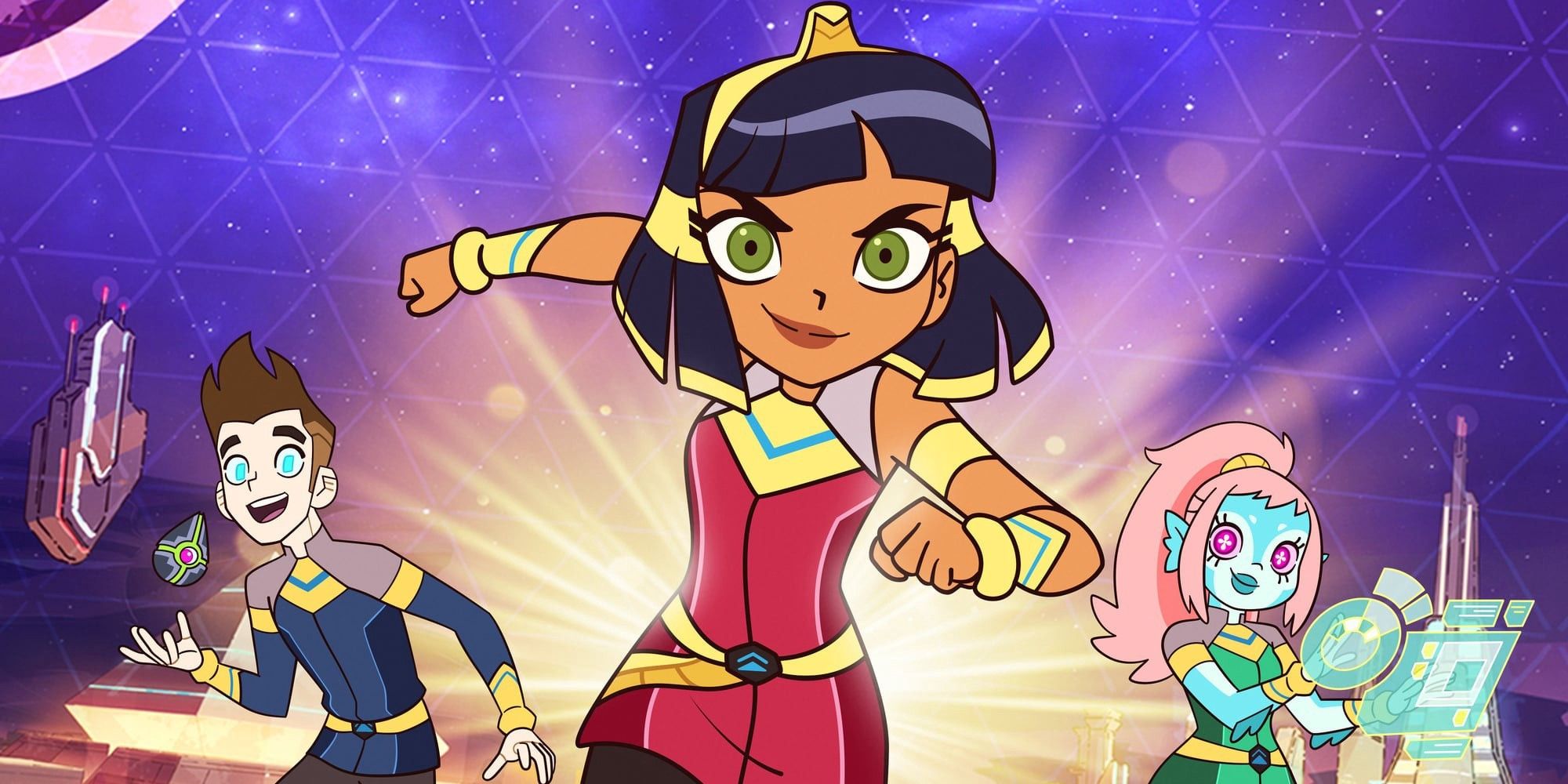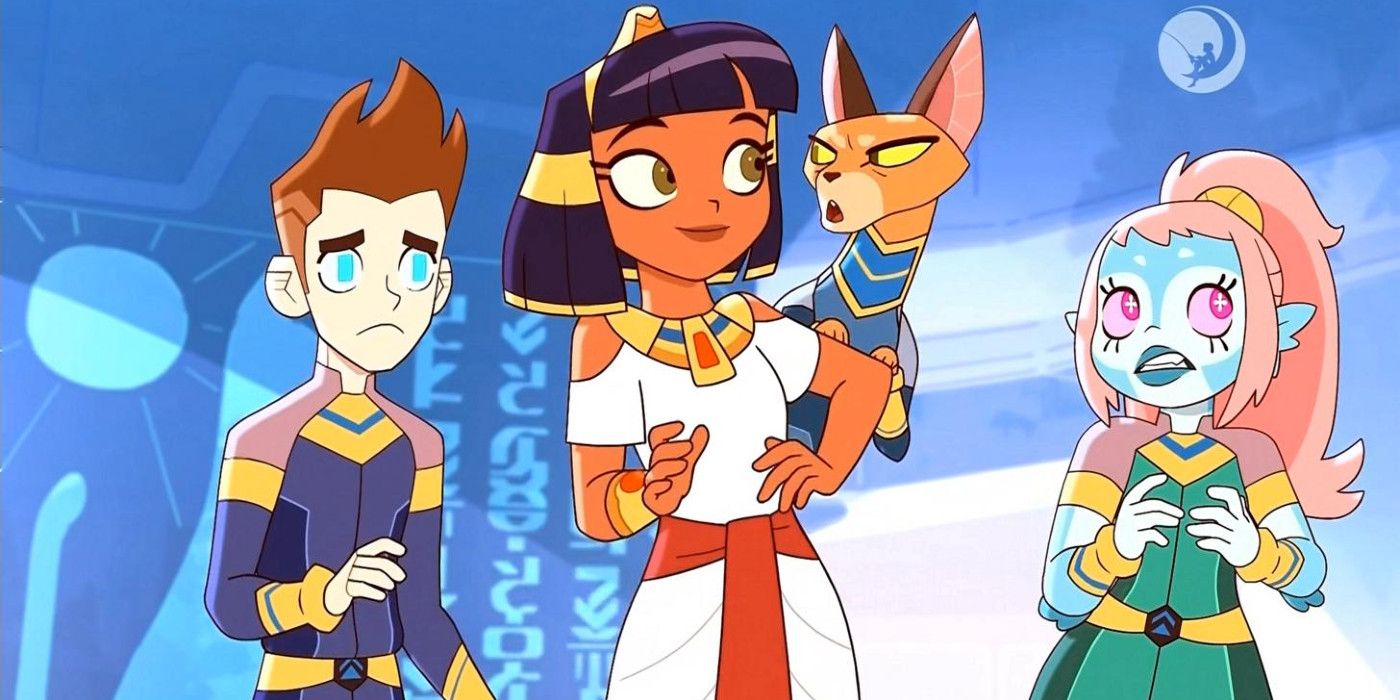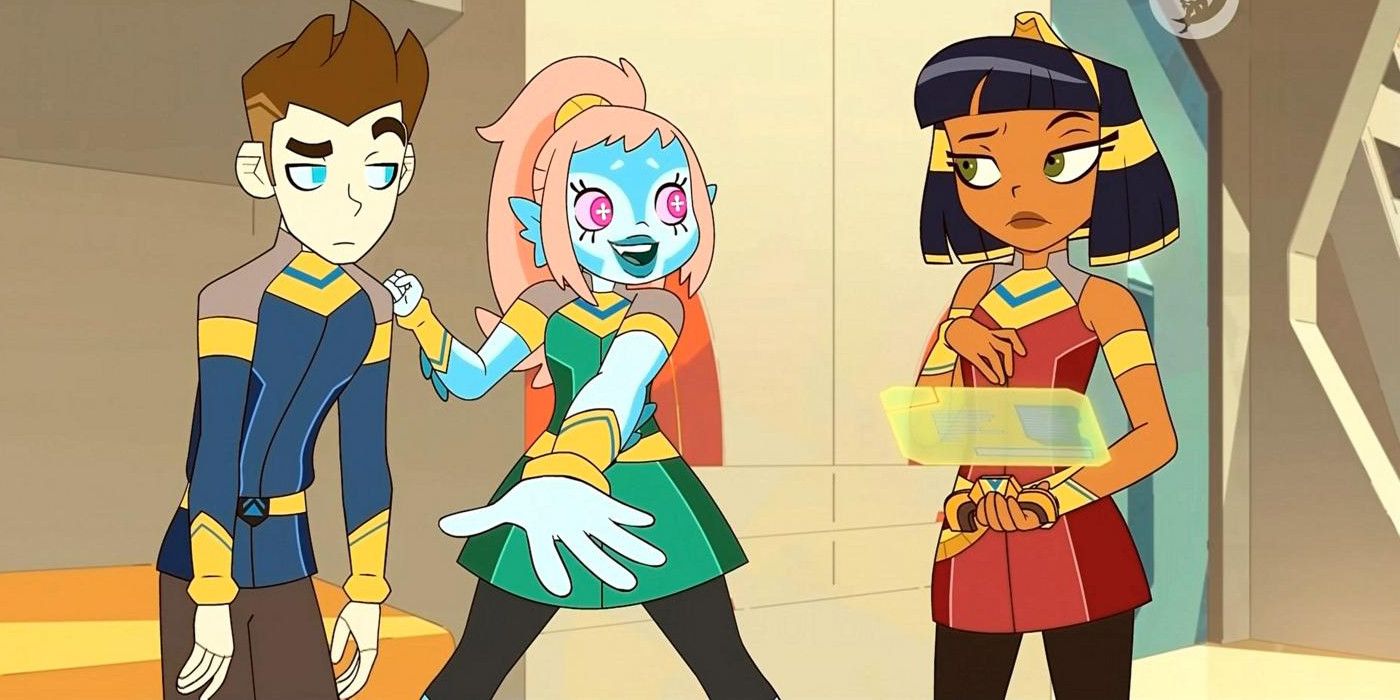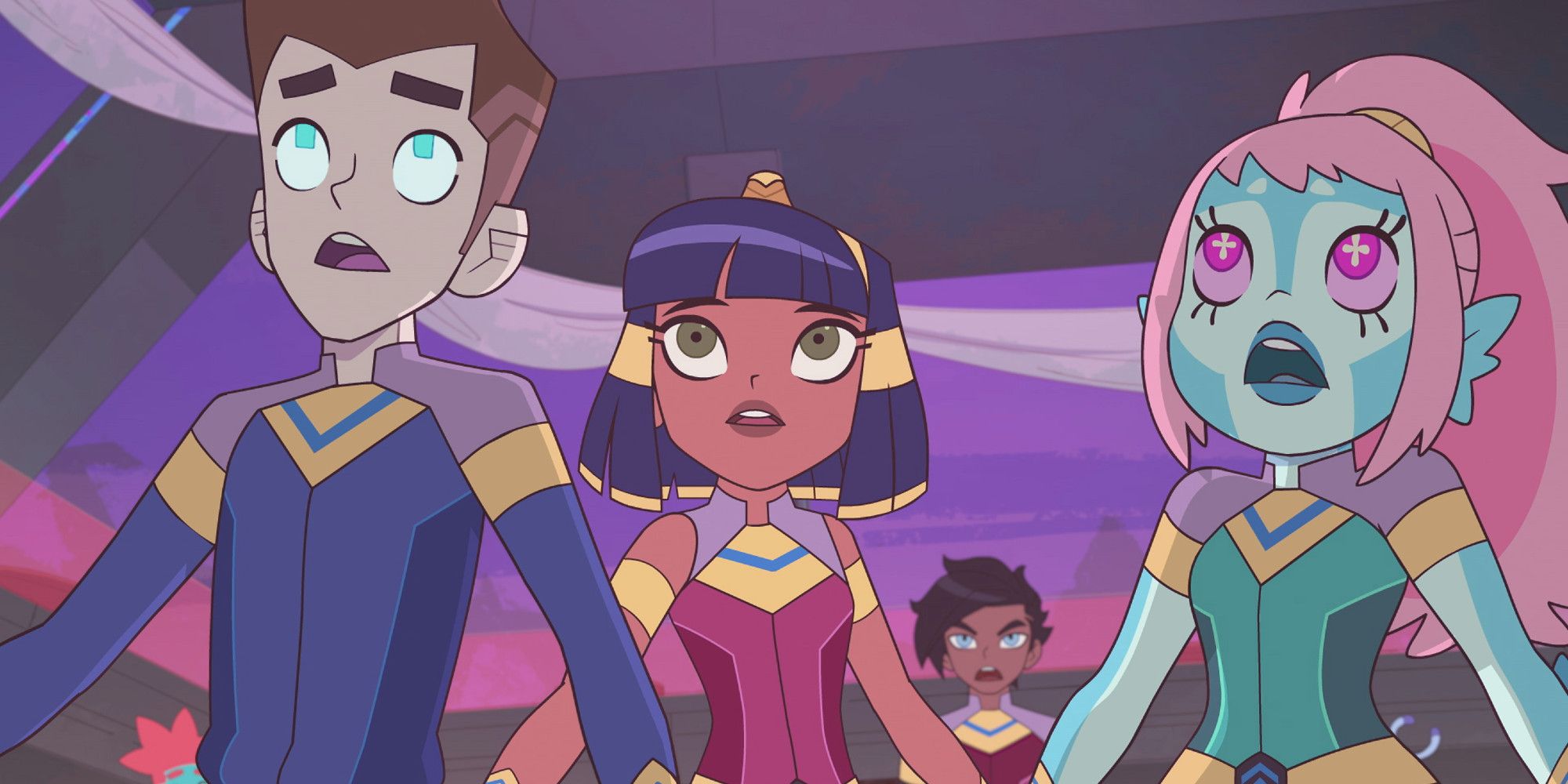Cleopatra in Space is a new animated series that finds the famed Egyptian princess sent 30,000 years into the future where she learns she's destined to save the galaxy. The cartoon is produced by DreamWorks Animation and is among the new programming available exclusively on Peacock, NBC's new streaming platform. Cleopatra in Space is available on Peacock Premium, meaning viewers will need to subscribe to the service's paid tier in order to stream it.
After being sucked through a portal and transported far into the future of an alien world, the teenage Cleopatra (Lilimar Hernandez) finds herself attending P.Y.R.A.M.I.D., an intergalactic academy that will teach her the skills necessary to fulfill her destiny as the Savior of the Nile Galaxy. There, she meets Khensu (Sendhil Ramamurthy), a talking cat who becomes her mentor and is a teacher at P.Y.R.A.M.I.D., and befriends Brian (Jorge Diaz), a cyborg, and Akila (Katie Crown), an alien fish girl. Together, the team helps in the fight against the forces of Xerxs and their evil leader, Octavian.
Cleopatra in Space began life as webcomic and later a series of graphic novels, all created by Mike Maihack. The television series is being overseen by Doug Langdale and Fitzy Fitzmaurice. Screen Rant had the chance to chat with Langdale about the development of Cleopatra in Space, the influence of Ancient Egypt on the show, and why action cartoons are finally embracing female leads.
I just watched a few of the episodes earlier today and they're great. I really enjoyed it. How did Cleopatra in Space come about? I know it's based on a comic, but was it a situation where they came to you or did you go to them?
We found it. It's a series of graphic novels. And DreamWorks had been trying to develop a feature based on them. And one of our executives sort of always, she always had her eye on it. She was like, 'Oh, if this movie doesn't work out, we want to do a series.' And so, when they couldn't figure out how to fit it all into a feature, and they let that go, and she was like, 'We're doing it!' So TV pounced on it. And they hired me and a couple other people to do development on it. I was at DreamWorks at the time working on the Puss In Boots series. So it was what I went on to after that, and I just, you know, I read the books and really loved them.
From the few episodes I saw - and I'm not familiar at all with the comics - but it seems like a concept that does work better as a series than it does as a movie.
Absolutely. Yeah, it's funny because the books cover sort of a longer span of time that would have been hard to fit in a movie. And then in the series, we're covering a similar span of time, but like on a more of a day-to-day basis. So in the books, they kind of--I think the second chapter is like six months after the first one, and our second episode is like the next day. So we're following more on a day-to-day basis. It's like, we went way the opposite direction of where a feature would have had to go and we're really getting into just the minute details of Cleopatra adjusting to this future world.
It sounds to me like this is very much not a straight adaptation of the comics, so fans are going to get something totally new with this.
Yeah, you know, hopefully. We talked to Mike Maihack a lot, the guy who did the books. We did love his books and it felt like he did that and he did it so perfectly, why just do it again? Why not take these characters and the setup and do something a little different and give the fans some other stories with those characters. So we didn't follow the books closely at all, but we followed the same set up, many of the same characters, and there are certain touch points that are the same, like storylines, but we kind of went off in our own direction.
Cleopatra in Space is set in this kind of future, Egyptian-inspired world. What kind of world building or mythologies did you get to develop for that? Did you work with Mike when you were planning that out?
Yeah, he has a pretty extensive backstory for everything. Like, there is a definite--he did a lot of world building on the books, and we went in a little bit different direction with the series. I think there are a lot of things that are the same, and a lot of things that are kind of in the background that you'll never know about. But it definitely feels like the future that Cleopatra is in doesn't feel like it's necessarily our future. Like, it feels like things progressed differently. Maybe because she disappeared? But it's a different future line than where our world would lead to. And that's true in Mike's books as well, but in a different way. So it gets--anytime you do a time travel story, there's a lot of potentially complex elements.
Interesting. And this is case of where you're not just adapting somebody's comic, but also a real historical figure. There will be those who are going to approach the show and be like, 'Oh, I kind of know some things about Cleopatra.' But then this is obviously a teenage Cleopatra in a completely new situation. Still, I caught that the villain is named Octavian, which is a reference to Augustus. Are there more ways that any real history gets built into Cleopatra in Space?
Yeah, there are some. Many of the character names are similar to names from Egyptian history. Some of them, apparently, coincidentally. There's a character named Akila, who none of us realized right away that her name is very similar to Achillas, who is one of the Egyptian generals. But like some or all of the cat characters on the show are named after various Egyptians and Egyptian gods and so forth, and they're characters who show up later who are based on specific characters from Egyptian mythology. So there's little bits and pieces of that.
Very cool, it gives the show a unique flavor that's unlike a lot of what's out there. Can you speak a bit about what influenced the show's art style? Did you draw heavily from the comic or did you want the TV show to have its own look?
We started from what's in the comic - which is not, you know, designed for the kind of animation we were doing. So we were like, 'Well, let's tweak it a bit to make it work better for animation.' And then I feel like we wound up changing it a lot, and then sort of moving a little bit back towards where we had started. Because once you start fiddling with it, it's hard not to go crazy. I think the finished result is not very far from what's in the books, it's a little more dimensional. And the books have more of like a graphic look, there's more, sort of, work with silhouettes and bold areas and color and stuff. And those books look fantastic, but it seemed like translating that for television was going to be--we were going to run into some roadblocks because every shot would have to be planned out very specifically to work because that's what Mike does when he does the books. So we needed to get something that was going to be a little easier to work with. I think we wound up a fairly close to the books after going through a pretty long journey to get there.
It's a very sleek style. Futuristic, but also a little retro. Their uniforms, especially. Hopefully we get to see some cool Cleopatra in Space cosplay someday. The show is also very funny, which I wasn't exactly expecting. How do you balance the action with the comedy?
Yeah, you never know on your show. I think we always felt like this was comedy-action rather than action-comedy. But, I mean, inevitably, you start doing a show and then the show kind of tells you what it wants to be. And very often, you have a fight with the show over what it's going to be. I've done shows that were supposed to be more comedy and wind up being more action. And I'm like, 'I know, we all wanted it to be more of a comedy show, but the show kept pulling in the other direction, or vice versa.' It's like the show--like Cleopatra felt like it wanted to be a little bit more of a comedy than we had originally planned. And it was like, at some point, you can fight it all you want, but if the show wants to be funny, you gotta let it.
The main character of Cleopatra, I think, will be very surprising. She's so bold and gung-ho, she's very fun. And the actress, Lilimar Hernandez, she's great.
She is really great. I mean, just like right from the beginning. I think she was--she said she was 17 when we started doing this, she might have just turned 18. She's fairly close to the age of the character, and she was just so into it right from the start. She was just really fantastic.
Oh yeah, she sounds like just the perfect fit for Cleopatra. I recognized a few names when looking through the cast - John DiMaggio, Dee Bradley Baker, Sumalee Montano, Rhys Darby - who will all play bit parts throughout the series, but can you talk a bit about casting your lead actors?
Well, casting for the Khensu character was interesting because we really were going for more of a gruff character, and seeing him as more of a rough around the edges, gruff, little bit more of an action-y character. And then Sendhil came in and did this like rather sophisticated British thing, and from that point forward, I could not hear the character any differently. It was so different than what we'd been planning on and we just, we went with that. It had a big influence on how the character played throughout the series. So that was an interesting process. And Jorge Diaz, who plays Brian, is someone who had been, he had been on a couple of other DreamWorks shows, so they knew him pretty well there. And he was just super funny. And Katie Crown, who plays Akila, we loved her from the first audition. She's a writer on Bob's Burgers, actually. Also a voice actor. She's super funny.
Cleopatra, Brian, and Akila are obviously teenagers because they're attending high school, but what was the age demographic you had in mind for the show's audience?
I mean, what do they say? I don't know, 6 to 11? They always give a number, I think it's 6 to 11, and then I never think about it. I only know what I like, so I just try to make a show that I like and not put a lot of references to tax forms in it, you know? I mean, like, don't have a lot of boring adult stuff, and then just make something that's good. I think we were supposed to be aiming at 6 to 11, maybe it was even supposed to be more in the middle rather than the older end. I think we hit more towards the older end of that, I guess, but I don't really know.
I'm curious if the success of shows like She-Ra and the Princesses of Power, another DreamWorks show, or something like Star vs. the Forces of Evil had any impact. There have been more action cartoons with female protagonists recently and did that help make Cleopatra in Space happen?
Yeah, I don't know, that's a good question. I guess, I don't really think about it that much. I mean, I try. On Puss in Boots there are actually more female characters than male, although it was a male lead. So I do try to make an effort whenever we're conceptualizing a character. Basically, if the character is male, at some point, we all need to ask, 'Is there a reason that this character is male? Or did we just do that because everyone thinks that's the default?' So on Puss in Boots there were a number of characters who started out as male and became female because we were like, 'Why is this character not female?' And we wound up with more of a predominantly female cast. I think of it in terms of inclusion, but it doesn't have a big impact on--like, I'm not thinking about how they're trying to market it when I'm making it. So they may have been thinking this is a good time to make a show with a female lead. All I know is I used to pitch shows with female leads back in the '90s, and they would say, 'Nobody wants to watch an action show with a female lead.' And I'd be like, 'You guys are all dumb.' And then it turned out I was right, but it took a long time to find that out.
I thought exactly that when watching these episodes earlier today. Like, where was this show when I was a kid? I remember watching Teenage Mutant Ninja Turtles and Batman and all of that, which I love, but they were primarily these boys clubs. So it's been very nice to see that change. I asked earlier about what age demographics were mind when Cleopatra in Space was developed, and with that, if there are future seasons, would you like to see the show grow up with its audience?
That's a good question. The first 12 episodes take place within a few months, it doesn't feel like it's spread over a long time. But I think eventually, if we had enough pieces, it would be nice to see the characters maybe graduate from this academy they're attending, like, move into another phase. But honestly, I hadn't thought that far ahead. I think that would be cool.
We can only hope. Cleopatra in Space is being made available on Peacock, NBC's new streaming platform. Has developing the show for streaming as opposed to regular television airing been any different?
Well, the last few shows I've done have been for streaming, actually they've all been for Netflix. So I'm kind of used to it. It's interesting because it feels like it's really evolving, just like, how episodic versus serialized the shows are. Cleopatra felt like it's a little bit more self contained stories, although there is an overall story arc that's going on. And then, I've done other shows for streaming that are very much like it's one big story spread out over, you know, 9 or 10 episodes. It's interesting to watch that evolve. And it's always interesting when you find out a little ways in that everyone has a slightly different idea of how serialized the show is. That can be fun. But I think we found a really good balance on Cleo where we are telling a larger story but there's room to do individual, sort of one off stories.
Cleopatra in Space season 1 is now available to stream on Peacock Premium.




